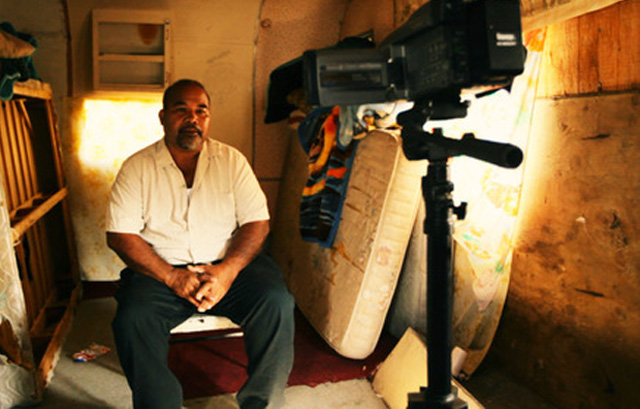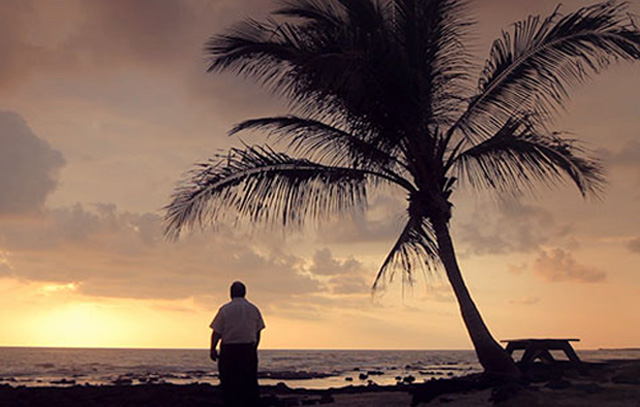CHICAGO – In anticipation of the scariest week of the year, HollywoodChicago.com launches its 2024 Movie Gifts series, which will suggest DVDs and collections for holiday giving.
Interview: Director Andrew Williamson Discovers ‘The Land of Eb’
CHICAGO – “The Land of Eb,” released through Video On Demand last week, is a perfect example of stories that emerge from the expansion of digital filmmaking. The highly personal and location-specific story involves the other side of paradise, the Kona district on the big island of Hawaii, and the background of the residents.
Writer/Director Andrew Williamson is part of the Kona Film Group, and came across the latest movie subject by hearing the story of the man – Jonithen Jacob – who eventually became the main character in the film. “The Land of Eb” is a fictionalized story of Jacob’s life, and the lives of his family and friends. Many of the natives in Kona, including Jacob’s family, were relocated from the Northern Pacific Marshall Islands, when they were destroyed by the United States during atomic bomb testing from 1946 to 1958. The result of this is what the U.S. has called “the most contaminated place on earth.” The health fallout from these tests continued into the 1990s, and is one of the narrative threads within the film.

Jonithen Jackson Waits for His Close-up in ‘The Land of Eb’
Photo credit: GoDigital
“The Land of Eb” was also in the New Directors Competition the 49th Chicago International Film Festival in 2013. HollywoodChicago.com talked to Andrew Williamson about the film’s origins, characters and determinations to get the story to the screen, speaking on the phone from Hawaii.
HollywoodChicago.com: What is the background and origin of the film? Was it the history of the islanders or a particular incident that inspired the film?
Andrew Williamson: It was meeting the man who ended up playing the main character in the film, Jonithen Jackson. I’ve lived here in Kona for ten years, and he’s been here about twenty. I met him through a mutual friend, and learned of his history and why his family ended up here, and Jackson himself was interested in making movies but didn’t know how to do it. We established a friendship, and I was inspired by his story to make the film, and also it gave him an opportunity to learn about filmmaking.
HollywoodChicago.com: So the character he played in the film was essentially him in real life, correct?
Williamson: Yes, the script was taken from his life. We fictionalized a lot of parts, but generally he’s playing a character that is much like himself.
HollywoodChicago.com: How were you able to take amateur actors and mold them into the representatives for the story?
Williamson: Well, at first I wasn’t sure if we’d be able to do it. [laughs] We just had to go for it. The script process was about getting the Marshall Islands language right – I don’t speak Marshallese – and that was a challenge. After John Hill and I wrote the script in English, it was Jonithen’s daughter that translated the whole script.
In rehearsal with the actors, I began to realize it wasn’t working. The script was a straight translation, but it wasn’t written in the way they actually talk. So in going over the script again, I talked to each of the actors about their characters in each scene, and asked they how they would talk. So they rewrote their lines in a way in which they would say it naturally. That’s how the acting progress began, and it helped us to get to a place that worked.
HollywoodChicago.com: How does survival play into the theme of ‘The Land of Eb’? What do you admire about the Marshall Island people and their skills of surviving on Kona, with their history and low economic status?
Williamson: What I experienced was a community that is still having a hard time assimilating. In trying to mix with the locals in Kona, they still are attached more to their own community and culture. The difference in Jonithen, was that he was trying to push his family and community to assimilate more – to go the schools, including college, and work toward getting better jobs. He is the beacon in the community, working to break the cycle of poverty and create new opportunities.
HollywoodChicago.com: You are a relative newcomer as a filmmaker, but what tricks have you learned on other sets and your short films that made ‘The Land of Eb’ a smoother process for you?
Williamson: Most of the independent films I’d worked on were low or no budget, and I couldn’t hire all professionals, both for the crew and the actors. I had learned that beforehand, and also learned to make sure I had clear communication with each of the persons responsible for their role in making the film – whether it was the Director of Photography, Set Designer or Make-up, for example. I learned about keeping a eye on everything through the previous projects I’ve worked on here.

Another Other Side of Hawaii in Andrew Williamson’s ‘The Land of Eb’
Photo credit: GoDigital
HollywoodChicago.com: On micro budget films, often things that you plan are limited by that budget or situations on set. Is there any scene or circumstance during the filming of ‘The Land of Eb’ that came out of the seat-of-the-pants adjustments, that actually turned out better than you expected?
Williamson: The truck that we used, the older model International Harvester Scout, was a blessing and a curse. In the film, it breaks down a couple of times, but that was happening for real. [laughs] It turned out being a character reflection for Jonithen, but a pain in the ass for the crew. At one point, it burst into flames, and we had to quickly put it out.
The original Scout we had completely broke down after one scene, so we had to scramble to find another one. Jonithen found another one for sale, and I bought for the production and gave it to Jonithen afterward. It ended up being perfect for the film and his character.
HollywoodChicago.com: What part of the history of the nuclear weapon testing at Marshall Islanders do you find most intriguing. What do you think the U.S. government owes those people in addition to what they already have given them?
Williamson: I was amazed by the fact that the U.S. took a whole community away from their homes, to then essentially destroy it. And the tragedy came about through the relocation nearby – food became an issue and of course the radiation fallout and the health issues it caused. It’s good to have a full story and understanding.
We set the testing in motion because of what we were doing as a country, but the implications that follow lasted for decades. At the very least, we as a nation should reflect on it, and understand what can be done to help. I don’t have the answers, but it’s just an example of the skeletons in the closet of a superpower nation.
HollywoodChicago.com: Hawaii is always considered a bit of paradise by the mainlanders. You showed another side of the island that is less than paradise. What other characteristics about the Hawaiian Islands would mainland folks be surprise to hear, that is opposite to the paradise theme?
Williamson: I was involved in making a film about a Crystal Meth addict, and this zip code in Kona has one of the highest uses of that drug per capita. There is definitely problems with that, in association with poverty and lack of education. There has been a lot of disenfranchisement of native peoples in the history of Hawaii, and it’s amazing what the implications are regarding that, and how it is still an issue.
HollywoodChicago.com: What directors are your influences, and have you included any homages to them within the composition of ‘The Land of Eb’?
Williamson: I’m influenced by Asian cinema, most recently by filmmakers like Edward Yang [“Yi Yi”]. There are also some recent Iranian filmmakers that I admire, and the pacing in my films are similar to both styles. They tend to use a lot less editing, and the feeling I get from watching them – and what I do – is in planning a scene and letting it play out. I like the idea of letting the characters live in front of the camera.
 | By PATRICK McDONALD |


